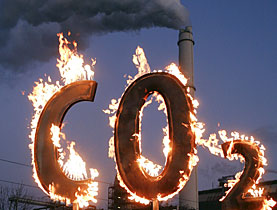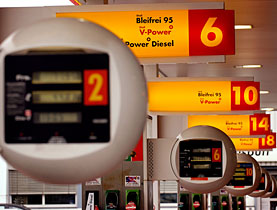Environment ministers face double challenge

The world must work out a "Green New Deal" to fix its twin climate and economic crises, according to United Nations Secretary-General Ban Ki-moon.
Swiss Environment Minister Moritz Leuenberger, who also spoke at the UN climate talks in Poznan, Poland, said there were similarities between the two crises and called for “global solutions and binding commitments”.
“Since we met in Bali [in December 2007], the world has changed dramatically,” Leuenberger said on Thursday.
“Banks and financial institutions have failed and governments have had to help them. As a result, we are about to slide into one of the worst recessions of recent decades. We have another dramatic change to overcome as well: the climate crisis.”
In both cases, he said, the causes and the consequences were well-known, the risks were ignored and the damage was global – as were the only possible solutions.
In Poznan some 190 countries are working on a new climate treaty to replace the Kyoto Protocol, which expires in 2012. The aim is to get a deal next December at UN talks in Copenhagen, Denmark.
“Switzerland is determined to play its part,” Leuenberger added. “We’re following the aims of the European Union and therefore propose to reduce our emissions by 20 per cent by 2020. We will even reduce our emissions by 30 per cent if other countries pledge to do the same.”
The UN Climate Panel says global warming from greenhouse gases, mainly generated from burning fossil fuels, will cause more floods, droughts, heatwaves and rising seas.
Leuenberger added that while it was “entirely justified” for the major emerging economies to demand more influence on the future rules for the financial markets, “these countries must be willing to take more responsibility in the efforts to combat climate change”.
“That’s why all countries should adopt binding commitments. For example, they could agree to reduce their emissions in specific sectors, such as the cement and steel industries,” he said.
“In the longer term, however, I believe it would be fair for every citizen of the world to have a personal CO2 budget: a limited amount of CO2 which he or she has the right to emit.”
“Green New Deal”
Ban appealed for a modern, global environmental equivalent of US President Franklin Roosevelt’s 1930s “New Deal”, which lifted the United States out of the Great Depression.
Coping with the financial crisis would need a “massive stimulus”, he added. “A big part of that spending should be an investment – an investment in a green future.”
Leuenberger said Switzerland was one of many governments to have responded with packages of measures to help the struggling world economy.
“However, we should not make the mistake of thinking that because we have to spend money for the financial crisis, the task of protecting the climate must be put on ice. That would be a fatal and fundamentally wrong move. In fact we must do the opposite: we must invest in technologies and infrastructures as well as in improving our energy efficiency,” he said.
“That’s why I renew our proposal for a CO2 levy in line with the ‘polluter pays’ principle, in order to repair some of the damage caused by climate change and prevent further damage from occurring. This proposal is an investment in a safer and more secure future.”
Misperceptions
Climate campaigner Al Gore on Thursday urged negotiators to free themselves of outdated ways of looking at the planet.
Gore said the delegates – like everyone else – were vulnerable to misperceptions, just as people once thought the sun revolved around the Earth.
He said scientists disproved that, beginning with the Polish astronomer Copernicus. Today, misperceptions may mislead us to believe there is little urgency to fight climate change. But scientists say quick action is needed to avoid catastrophic consequences.
Environmentalists at the talks have strongly criticised some of the world’s richest countries, saying they have done too little to battle global warming. But many developing countries, including Brazil, China, South Africa and Mexico have won praise for offering specific plans to fight climate change.
Ban Ki-moon appealed for the EU not to abandon its ambitious climate project.
“We must re-commit ourselves to the urgency of our cause,” he said. “Yes, the economic crisis is serious. Yet when it comes to climate change, the stakes are far higher. The climate crisis affects our potential prosperity and people’s lives, both now and far into the future.”
swissinfo with agencies
The Poznan Climate Change Conference runs from December 1-12.
Temperatures in Switzerland have risen by an average of 0.57 degrees Celsius each decade since 1970. The increase is twice as much as the average for the northern hemisphere.
Carbon dioxide is one of the major gases responsible for the greenhouse effect and global warming. In Switzerland it represents around 80% of harmful emissions. Other gases include methane, nitrous oxide and hydrocarbons.
Despite ambitious emission targets, greenhouse gas emissions have actually risen by 0.4% in Switzerland since 1990.
Kyoto, a 178-nation accord, is a 1997 annex to the 1992 UN climate treaty that requires 37 industrial nations to reduce greenhouse gas emissions by an average of five per cent below 1990 levels by 2010.
The Swiss parliament ratified the Kyoto Protocol on climate change in 2003. Switzerland undertook to reduce its CO2 emissions to ten per cent less than 1990 levels by 2010.
Despite ambitious emission targets, greenhouse gas emissions have actually risen by 0.4% in Switzerland since 1990.
A CO2 law came into force in 2000 to ensure that the Kyoto target was achieved. About a thousand enterprises have taken voluntary measures to reduce their emissions.
But it became clear by 2005 that these measures were not sufficient. It is proving difficult, however, to agree on how to strengthen them.

In compliance with the JTI standards
More: SWI swissinfo.ch certified by the Journalism Trust Initiative












You can find an overview of ongoing debates with our journalists here . Please join us!
If you want to start a conversation about a topic raised in this article or want to report factual errors, email us at english@swissinfo.ch.